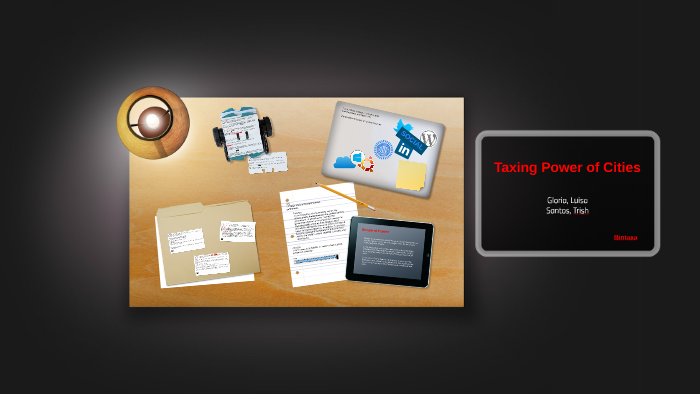Limitations on LGU's taxing power (Sec. 133, Art. X)
Sec. 133, Article X of the Local Government Code (LGC) lays down the common limitations on the taxing powers of LGUs. Thus:
Section 133. Common Limitations on the Taxing Powers of Local Government Units. - Unless otherwise provided herein, the exercise of the taxing powers of provinces, cities, municipalities, and barangays shall not extend to the levy of the following: (a) Income tax, except when levied on banks and other financial institutions;
(a) Income tax, except when levied on banks and other financial institutions;
(b) Documentary stamp tax;
(c) Taxes on estates, inheritance, gifts, legacies and other acquisitions mortis causa, except as otherwise provided herein;
(d) Customs duties, registration fees of vessel and wharfage on wharves, tonnage dues, and all other kinds of customs fees, charges and dues except wharfage on wharves constructed and maintained by the local government unit concerned;
(e) Taxes, fees, and charges and other impositions upon goods carried into or out of, or passing through, the territorial jurisdictions of local government units in the guise of charges for wharfage, tolls for bridges or otherwise, or other taxes, fees, or charges in any form whatsoever upon such goods or merchandise;
(f) Taxes, fees or charges on agricultural and aquatic products when sold by marginal farmers or fishermen;
(g) Taxes on business enterprises certified to by the Board of Investments as pioneer or non-pioneer for a period of six (6) and four (4) years, respectively from the date of registration;
(h) Excise taxes on articles enumerated under the national Internal Revenue Code, as amended, and taxes, fees or charges on petroleum products;
(i) Percentage or value-added tax (VAT) on sales, barters or exchanges or similar transactions on goods or services except as otherwise provided herein;
(j) Taxes on the gross receipts of transportation contractors and persons engaged in the transportation of passengers or freight by hire and common carriers by air, land or water, except as provided in this Code;
(k) Taxes on premiums paid by way or reinsurance or retrocession;
(l) Taxes, fees or charges for the registration of motor vehicles and for the issuance of all kinds of licenses or permits for the driving thereof, except tricycles;
(m) Taxes, fees, or other charges on Philippine products actually exported, except as otherwise provided herein;
(n) Taxes, fees, or charges, on Countryside and Barangay Business Enterprises and cooperatives duly registered under R.A. No. 6810 and Republic Act Numbered Sixty-nine hundred thirty-eight (R.A. No. 6938) otherwise known as the “Cooperative Code of the Philippines” respectively; and
(o) Taxes, fees or charges of any kind on the National Government, its agencies and instrumentalities, and local government units.
 (a) Income tax, except when levied on banks and other financial institutions;
(a) Income tax, except when levied on banks and other financial institutions;(b) Documentary stamp tax;
(c) Taxes on estates, inheritance, gifts, legacies and other acquisitions mortis causa, except as otherwise provided herein;
(d) Customs duties, registration fees of vessel and wharfage on wharves, tonnage dues, and all other kinds of customs fees, charges and dues except wharfage on wharves constructed and maintained by the local government unit concerned;
(e) Taxes, fees, and charges and other impositions upon goods carried into or out of, or passing through, the territorial jurisdictions of local government units in the guise of charges for wharfage, tolls for bridges or otherwise, or other taxes, fees, or charges in any form whatsoever upon such goods or merchandise;
(f) Taxes, fees or charges on agricultural and aquatic products when sold by marginal farmers or fishermen;
(g) Taxes on business enterprises certified to by the Board of Investments as pioneer or non-pioneer for a period of six (6) and four (4) years, respectively from the date of registration;
(h) Excise taxes on articles enumerated under the national Internal Revenue Code, as amended, and taxes, fees or charges on petroleum products;
(i) Percentage or value-added tax (VAT) on sales, barters or exchanges or similar transactions on goods or services except as otherwise provided herein;
(j) Taxes on the gross receipts of transportation contractors and persons engaged in the transportation of passengers or freight by hire and common carriers by air, land or water, except as provided in this Code;
(k) Taxes on premiums paid by way or reinsurance or retrocession;
(l) Taxes, fees or charges for the registration of motor vehicles and for the issuance of all kinds of licenses or permits for the driving thereof, except tricycles;
(m) Taxes, fees, or other charges on Philippine products actually exported, except as otherwise provided herein;
(n) Taxes, fees, or charges, on Countryside and Barangay Business Enterprises and cooperatives duly registered under R.A. No. 6810 and Republic Act Numbered Sixty-nine hundred thirty-eight (R.A. No. 6938) otherwise known as the “Cooperative Code of the Philippines” respectively; and
(o) Taxes, fees or charges of any kind on the National Government, its agencies and instrumentalities, and local government units.
